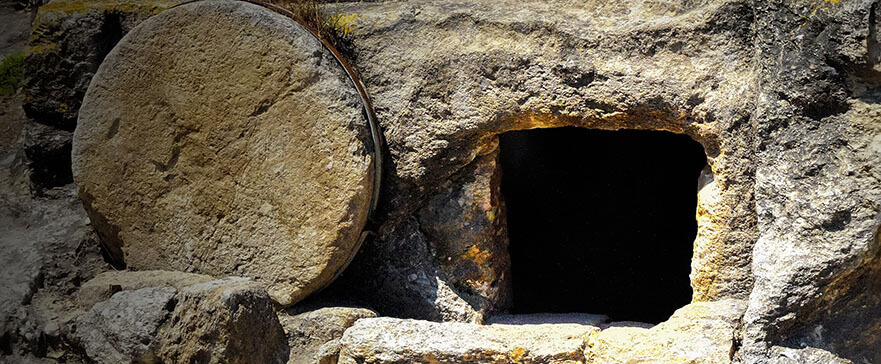Psalm 16:10 is a key verse from the Old Testament the apostles used to defend the resurrection of Jesus Christ our Lord: “For you will not leave my soul in Sheol, nor will You allow Your Holy One to see corruption.” Both Peter and Paul strongly suggested that this verse looks forward to and predicts the fact that although Christ died on the cross, He did not undergo corruption and decay. This prediction, in turn, leads to the conclusion that Jesus is now alive by the resurrection on what we call Easter Sunday. This is our supreme hope as Christians.
While suffering great loss, Job had asked the penetrating question, “If a man dies, shall he live again?” (Job 14:14). The answer that Jesus gives is a loud “Yes!” He told His disciples, “A little while longer and the world will see Me no more, but you will see Me. Because I live, you will live also” (John 14:19). Resurrection Sunday means that if we know the Lord and if our loved ones who have died have trusted Christ as their only hope for heaven, we will hug their necks again one day when we are all with the Lord. Christ makes it possible by His death for our sins and His resurrection from the dead.
David or Christ?
However, the use of Psalm 16:10 as a statement about Christ’s coming resurrection is somewhat controversial. Psalm 16 is a psalm of David, and the features of the psalm as a whole reflect David’s thoughts about his own life. In light of this, some prefer to see David as only talking about himself and not Christ in verse 10. They believe David was resting on the promise that God will not allow him to experience ultimate decay in the grave (taking the Hebrew word Sheol as “grave”). Instead, God would raise David to new life in a resurrected body one day in the future.
Another view, one that is popular among some conservative Bible-believing Christians, is that Psalm 16:10 is a typological statement. This means that the passage is about David but is also a type or picture of Christ who was to come. The passage is taken in the same way as the animal sacrifices offered under the Mosaic Law in the Pentateuch. Those sacrifices functioned well within God’s purposes for the generation that made the animal sacrifices. Yet those sacrifices pointed ahead to the ultimate sacrifice of Jesus on Calvary’s cross. With respect to Psalm 16:10, this view says that David wrote of both his own future resurrection and Christ’s resurrection in the future.
The Apostles’ Proof
However, the apostles seemed to argue in a different direction using Psalm 16:10. In doing so, their interpretation was still consistent with the meaning of the verse in its own context. In Acts 2:29, Peter reminded the audience that the tomb of David was with them and that he was “both dead and buried.” The point seems to be that God had allowed David’s body to suffer corruption in the grave. The apostle then noted that David was a prophet (2:30) who foresaw the coming of Christ, David’s descendant (2:31). Peter quoted Psalm 16:10, showing that Jesus’ body did not see corruption in the grave due to His resurrection soon after His death.
Psalm 16:10 could not be speaking about David but had to be speaking of a future descendant of David, namely Jesus.
Psalm 16:10 could not be speaking about David but had to be speaking of a future descendant of David, namely Jesus. In Acts 2:32, Peter added that they knew Jesus was raised from the dead because they were witnesses of this historical miracle. Likewise, Paul, after alluding to Psalm 16:10, said, “For David, after he had served his own generation by the will of God, fell asleep, was buried with his fathers, and saw corruption; but He [Christ] whom God raised up saw no corruption” (Acts 13:36–37).
The last interpretation of Psalm 16:10 fits best. Many other psalms, particularly written by David, contain elements that do not fit the life of David perfectly. They predictively allude to a future One, the Jewish Messiah, who was coming. Thus, we can confidently use Psalm 16:10 in the same way the apostles did. In doing so, we have one more piece to the exciting news that “Jesus is alive!” That is the centerpiece of our Christian faith. Without it, we have nothing. With its truth overwhelming us, we have everything!





5 Comments on “Psalm 16: Predicting the Resurrection”
Great Article Mike.
Precisely, the final exegesis. Thank you.
Amen
Thank you for your teaching. Appreciate growing in deeper and fuller understanding of God’s Word.
Great article my friend!